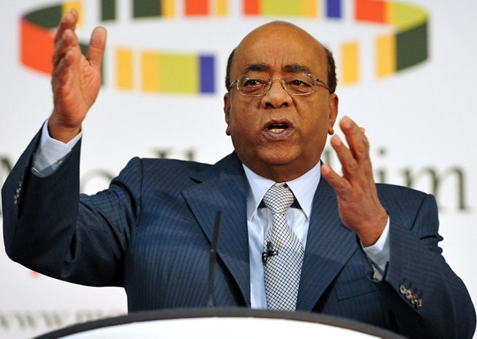
Mo Ibrahim
The overall governance performance of 21 African countries have plummeted since 2011, with only six registering an improvement in all four categories of the Ibrahim Index of African Governance (IIAG), which was launched today.
The six are Cote d’Ivoire, Morocco, Rwanda, Senegal, Somalia and Zimbabwe.
In the case of conflict-ravaged Somalia, coming from a very low base, any upward movement is seen as progress.
But with a score of just 8.5 (out of 100.0) it is the continent’s weakest governance performer, over 70 points below top ranking Mauritius, which recorded a score of 79.9 on the Index.
The 2015 IIAG covers a 15-year data period from 2000 to 2014.but all trends described are for the latest four years.
The IIAG indicates that from 2011 to 2014 the progress of governance in Africa has stalled, and reveals a shifting landscape.
During the period 2011 to 2014, the African average overall governance score in the IIAG increased only slightly by +0.2 points to 50.1, with considerable changes in performance during the last four years at all levels of the Index, both at country and at category level.
Over the last four years, only half of the top 10 governance performers managed to improve their overall governance score.
Published annually by the Mo Ibrahim Foundation, the IIAG provides a comprehensive assessment of governance performance for each of the 54 African countries.
The 2015 IIAG consists of 93 indicators which fall into four categories: Safety and Rule of Law, Participation and Human Rights, Sustainable Economic Opportunity, and Human Development.
“While Africans overall are certainly healthier and live in more democratic societies than 15 years ago, the 2015 IIAG shows that recent progress in other key areas on the continent has either stalled or reversed, and that some key countries seem to be faltering,” noted Foundation Chairman Mo Ibrahim.
“This is a warning sign for all of us. Only shared and sustained improvements across all areas of governance will deliver the future that Africans deserve and demand.”
The top three countries, Mauritius, Cape Verde and Botswana, all registered a decline in overall governance and in at least two of the four components over the last four years, calling into question whether these countries will continue to dominate the top of the rankings in future, noted the IIAG.
The bottom three countries in overall governance are Central African Republic (24.9), South Sudan (19.9), which was included for the first time, and Somalia (8.5).
South Sudan (-9.6), another conflict-ridden country, and Central African Republic (-8.4) have also registered the most extreme deteriorations, along with Mali (-8.1).
The top 10 improvers in overall governance over the last four years represent almost a quarter of the continent’s population, the IIAG pointed out.
Five of these, Senegal (9th), Kenya (14th), Morocco (16th) Rwanda (11th) and Tunisia (8th), already rank in the top 20 of the IIAG, leading to the question of whether they might become the continent’s next powerhouses.
The IIAG also shows that there is a widening gap in performance between the regions.
For instance, Southern Africa remains the best performing region, with an average score of 58.9, followed by West Africa (52.4), North Africa (51.2) and East Africa (44.3).
Central Africa is the lowest ranking region with an average score of 40.9, and is the only region to have deteriorated since 2011.
The marginal improvement in overall governance at the continental level is underpinned by positive performances in only two categories, Human Development (+1.2) and Participation and Human Rights (+0.7), according to the IIAG.
Both Sustainable Economic Opportunity (-0.7) and Safety and Rule of Law (-0.3) have deteriorated.
The Mo Ibrahim Foundation was established in 2006 with a focus on the critical importance of leadership and governance in Africa.
By providing tools to support progress in leadership and governance, the Foundation aims to promote meaningful change on the continent.
Source: GNA























